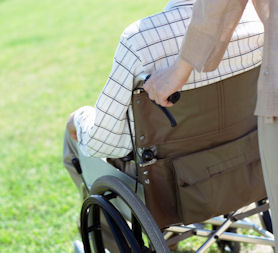Disabled fear losing out from benefit reform
The benefits system overhaul will make it better for all, the Government says, as the Welfare Bill comes out. But many, including people with disabilities, tell Channel 4 News they fear losing out.

The Welfare Bill outlines some of the biggest changes ever made to the welfare and benefits system, including the introduction of the Universal Credit, a single benefit designed to simplify the system by replacing the tens of payments made currently.
The Coalition believes the system at the moment is too complex, does not encourage people to get back into work, and is also too expensive, so is introducing a ream of reforms aiming to address these concerns.
“We want a system which isn’t seen as a doorway to hopelessness and despair.” Iain Duncan Smith
The most dramatic is the Universal Credit, which will unify out-of-work benefits, Housing Benefit and Tax Credits into one payment.
Introducing the plan in November last year, the Secretary of State for Work and Pensions, Iain Duncan Smith, said: “Society has changed but the benefits system has failed to change with it.
“So it is time to bring welfare into the 21st century. We want a system which isn’t seen as a doorway to hopelessness and despair but instead as a doorway to real aspiration and achievement. I don’t say our programme is a panacea. I can’t say it will change everything. But I do say it’s a start.”
Fears
However, many people are worried about the impact of the changes. Controversy has already greeted other changes to housing benefit and child benefit – and Mr Duncan Smith has confirmed that plans to cut housing benefit for long-term dole claimants had been dropped in the bill.
Research done by the Institute for Financial Studies (IFS) on the “winners and losers” of the Universal Credit system found that, while 2.5m working-age families will gain from the changes and 2.5m will continue to receive similar payments, 1.4m could lose out.
FactCheck: Universal Credit system will have some 'losers'
Ignoring any transitional protection and basing its research on the White Paper, the IFS found that the biggest losers will be single parent families, where around 20 per cent face losses in the changes. However, single parent families in different situations are also the biggest winners from the new system, with around 30 per cent likely to do well out of the change.
Other parts of society also fear the changes. Channel 4 News has looked at one area – benefits for people with disabilities, who fear their families are being particularly hard hit.

People with disabilities
The charity Disability Alliance found that proposed cuts to the welfare bill, along with the planned changes, had left many disabled people feeling that life was not worth living. Surveying 900 people, it found that 9 per cent feared the cuts would cause deaths and suicide.
There are two main changes to benefits for people with disabilities. One is connected to the arrival of the Universal Credit system. Employment Support Allowance (ESA), which unemployed disabled people get at a rate of either £96.85 or £91.45 a week, gets wrapped into the new system along with Jobseekers’ Allowance and other out-of-work benefits, and there will be a “work capability assessment” to access everybody receiving this kind of support.
This assessment is already being used for new applicants, but disability charities told Channel 4 News there are “significant problems” using it for disabled people.
Neil Coyle, Policy Director at Disability Alliance, said the time allotted per assessment and the specialism of assessors in terms of the condition of the disabled person were both concerns.
“A third of working age disabled adults live in poverty – and that’s before the work capability assessment potentially loses them support.” Neil Coyle, Disability Alliance
He said: “This means that many disabled people and their families will not be able to access the kind of support they would have had previously. We don’t know how things like disabled premiums or carers’ premiums will work, so there could be a knock-on effect for the whole family.
“There are positives – Universal Credit could lead to simplification, and we would welcome that. But the risk is that people will lose interlinked support. A third of working age disabled adults live in poverty – and that’s before the work capability assessment potentially loses them support. Universal Credit is meant to tackle that but we have not seen how yet.”
Reassessments of everybody receiving ESA (formerly incapacity benefit) – not just disabled people – have already been taking place in pilot programmes in Aberdeen and Burnley. 1,347 people have been assessed in the initial findings and just under 30 per cent (399 people) have been found fit for work. A further 526 people (39 per cent) are in the work-related activity of ESA, meaning with the right support they can start the journey back to work. A further 31 per cent are in the support group for ESA, meaning they will continue to receive unconditional support.
Overall, 1.5m people will be reassessed, the Government said.
A Department for Work and Pensions spokeswoman told Channel 4 News: “The work capability assessment has been developed and rolled out in Burnley and Aberdeen. We have also had the Harrington review which made recommendations into how we could change the work capability assessment for fluctuating conditions or mental health conditions – we’ve accepted these and they will all be in place by April.
“We’ve made a commitment to review the work capability assessment periodically over the next five years. With incapacity benefit, people went on it and were never seen again. The ESA helps them get back into work if they are capable of work, and work is good for people. If they are not fit to work, they would never be made to work.”
Who Knows Who
Welfare reform has been Iain Duncan Smith's passion for years. Find out more from Channel 4 News Who Knows Who on Iain Duncan Smith: missionary position on the welfare state
Disability Living Allowance
The other major expected change is the reform of Disability Living Allowance, a benefit which will remain outside the Universal Credit. For working age adults, this is likely to become the Personal Independent Payment, and will again be assessed through a new test. The benefit could also be cut, some fear, although the detail remains unclear and the consultation finishes on Friday – the day after the bill is published.
“There is a major threat to independence with the way it is being done.” Bharat Kerai, wheelchair user
Disability Alliance’s Neil Coyle added: “Based on what the Government has said about DLA, we could be looking at more than £1bn pulled from the budget. So it’s a change in benefit to mask a cut. And because some people receive so little, just to make the £1bn we would see 750,000 disabled people lose some support. There is no rationale for the cut and the effect on the quality of life for disabled people is huge.
“They say without DLA their lives will not be worth living.”
DLA is worth between £18.95 and £71.40 a week. The Government has not guaranteed the rates will stay the same and it could remove the lowest rate, threatening the payments to 643,000 people, Mr Coyle said.
A DWP spokeswoman told Channel 4 News: “We are consulting on the reform of DLA. It has not changed since 1992 – when 140,000 people were supposed to be on it. Now there are three million and it costs £12bn a year – after housing, that’s the highest. We have to make sure the people who go onto it need it most.”
She said the idea was that the benefit would remain at the current spend by 2014, but declined to give more detail on the intervening years.
“The fact is we are reforming the whole welfare state, it’s root and branch, the biggest reform for 60 years. To leave out DLA would make no sense. Around 140,000 people are on this benefit but they have not contacted the department for ten years – we want to see people and assess them, they may need more, they may need less. We have to make sure the welfare state money goes to those who need it most, and that it is fit for purpose,” she said.
Independence threat
Bharat Kerai is a 31-year old man living in London who receives DLA. He is a wheelchair user, and uses the payment for, among other things, transport to his job in local government - which he says he may have to stop, costing the Government more in the long-term, if his DLA ends.
He told Channel 4 News: "I think it is a good thing that there is some kind of review, I am sure there is fraud on it. But there's a major threat to independence with the way it is being done. They are talking about independent individuals but by reducing the levels of the payments, they won't. It needs to be looked at by the politicians - there is not enough focus on the independence side of it, people going to work and wanting to work. They think if they just throw money at them, they'll keep quiet. But I don't think that's the way forward."
Mr Kerai said his wheelchair makes it almost impossible for him to use public transport, so he uses his DLA mainly for his car. "Public transport in London is not really an option for me so I use DLA mostly for getting around. I am not saying disabled people don't have these needs but they do have the public transport option, which is not an option for me," he said.
Career
He said having a career would be impossible without the support of the DLA - particularly for young people just coming through the system and as a result of the potential hit on interlinked benefits.
He said: "I was lucky to have the financial support to have a career. But for the younger generation on lower support - I don't know if that will be possible. People need help getting ready in the morning, their families are not always there, they need special equipment. It's not just financial but it is a person's mental health and social health. If my DLA was gone, everything I do revolves around my car - going to my family's house, parties. I would manage, but it would be difficult. I know people with mental health issues who really rely on DLA and the fear of losing it takes them back."